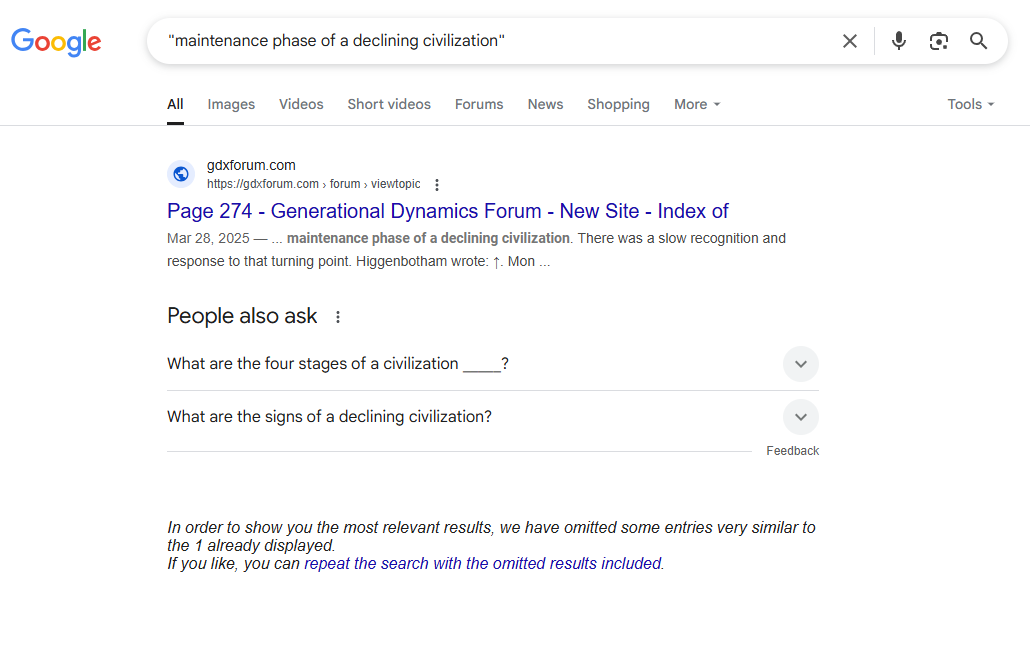John wrote: Mon Feb 02, 2015 3:15 pm
Thanks for your comments.
I've been doing this now for 12-13 years. It's gone through stages.
At first it was a theoretical exercise, almost as if I were solving a
math problem. Then it began to become more real, as things began to
happen. I was always able to rationalize this in my mind as being
able to pretend that I was a Martian watching what was happening
without any emotional attachment. Sometimes I would joke was that it
was like we were all in a moving theater watching a horrible movie,
and the doors are locked so we can't get out.
In recent years there's been a new stage. I write about horrible
things every day -- hundreds of girls in Nigeria being abducted and
raped, people in shopping markets being blown apart by car bombs,
people going through industrial strength torture in Syria, thousands
of people being killed with barrel bombs filled with bullets and
chlorine, China's military arming for a massive missile attack on the
United States, the massive criminality. I like to tell myself that I
can write about these things and not be personally affected, but
that's more and more difficult every day. Instead of being a Martian
watching these events from afar, I'm actually in the center of a
swirling tornado, being sucked in along with everyone else.
One thing I think about all the time is -- how come I'm the only one
doing something like this? Or, perhaps more to the point, why do I,
John Xenakis, seem to be only person in the world capable of doing it?
I know that with over 7 billion people in the world, that statement is
preposterous. And yet, after 12 years, my web site is unique in the
world. How is that possible? A lot of the things that I write about
don't even require anything like generational theory. There are
plenty of people in the world who have the same or superior analytical
abilities as me, and yet that doesn't seem to make a difference.
Also puzzling is other people's reactions to my web site. Some want
to read it every day, others absolutely can't stand it, and can't
stand me as a result. Ten years ago, friends I've known for years
treated my a harmless kook, but now, as the world worsens as predicted
by my web site, those friends now shun me. This is similar to the
mythical Cassandra, whom I've written about many time.
Over the weekend, I heard something that really struck a chord. There
was a BBC World Service show called "Why Factor," with the subject
"Sad/Gloomy Music." It turns out that some people can listen to sad
music and really enjoy it, while other people listen to sad music and
absolutely can't stand it.
The only "happy" music sample they played was The Beatles - I Want to
Hold your Hand. They played samples of a number of "sad" music songs:
Billie Holiday - Gloomy Sunday
James Taylor - Riding on a Railroad
Joni Mitchell - River
Kylie Minogue - Can't Get You Out of My Head
Johann Sebastian Bach - Prelude in B minor, number 24
Mikhail Ivanovich Glinka - La Separation
Felix Mikhailovich Blumenfeld - Etude Sur Mer
Arvo Pärt - Spiegel Im Spiegel
Djivan Gasparyan - I Am Outcast By You
The Rankin Family - Chi Mi Na Morbheanna
Oliver Mtukudzi - Neria
Víctor Jara - Te Recuerdo Amanda
Rain - M.R Shajarian
Chris Isaak - Wicked Games
Samuel Barber - Adagio for Strings
According to the show, the last in this list is the most popular
sad song among the show's listeners.
The show described the differences in chord structure between happy
and sad music, but unfortunately I know nothing about music and didn't
understand, which is too bad.
However, the difference is also generational: In the 1960s, most
popular music had the "happy" chord structure, while in the 2000s,
most popular music had the "sad" chord structure.
This also struck a chord with me. For my whole life, I've always
loved Great Band Era music, 1935-45, and I still have a large record
collection of Great Band Era songs. I'm going to guess that most
Great Band Era music had the "sad" chord structure, and I'm going to
guess that that's the reason I like it a lot more than most popular
music, and I'm going to guess that my enjoyment of Great Band Era
music is related to my being able to do this web site every day.
There's a theory having to do with the hormone prolactin. It has to
do with milk production in pregnant women, and has no known normal
function in men. However, there's some research that people who like
sad music have an excess of prolactin, and those who hate sad music
don't have enough prolactin. So maybe what makes me unique is that my
blood is overflowing with prolactin. And also, maybe the people who
read my web site have more prolactin than average, and those who can't
stand it have less.
According to Prof David Huron of Ohio State University: The research
shows that for ordinary sadness, when we're in that state, we are our
most deadly realistic in our self-appraisal. It has beneficial
effects on judgment, on memory, all sorts of cognitive benefits that
happen from being in a saddened state.
So if we apply all this to me, then this is the theory: I have an
above average analytical ability, I have just the right education,
and, most important, I have too much prolactin in my blood. And
that's why, Dear Reader, I'm able to write for this web site every
day. And for similar reasons, that's why you read it every day.
Links:
http://www.bbc.co.uk/programmes/p01gmhx6
http://www.bbc.co.uk/podcasts/series/whyfactor
http://downloads.bbc.co.uk/podcasts/wor ... -1445a.mp3

